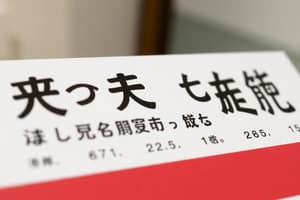Podcast
Questions and Answers
What is the translation of 'おはようございます'?
What is the translation of 'おはようございます'?
- Hello.
- Good morning. (correct)
- Goodbye.
- Good evening.
Which of the following words means 'thank you'?
Which of the following words means 'thank you'?
- こんにちは
- ありがとうございます (correct)
- ざっし
- すみません
What does 'しんぶん' refer to?
What does 'しんぶん' refer to?
- newspaper (correct)
- letter
- magazine
- book
Which of the following phrases means 'Excuse me'?
Which of the following phrases means 'Excuse me'?
What does the word 'がくせい' mean?
What does the word 'がくせい' mean?
Which term refers to 'housewife'?
Which term refers to 'housewife'?
What does 'みず' translate to in English?
What does 'みず' translate to in English?
What is the meaning of 'きょうし'?
What is the meaning of 'きょうし'?
Which of the following words is NOT a Japanese script?
Which of the following words is NOT a Japanese script?
What does 'きょうしつ' refer to?
What does 'きょうしつ' refer to?
Flashcards
Arigatoo gozaimasu
Arigatoo gozaimasu
This is Japanese for "thank you."
Ohayoo gozaimasu
Ohayoo gozaimasu
This is Japanese for "good morning."
Konnichiwa
Konnichiwa
Learners use this expression to say "Hello".
Konbanwa
Konbanwa
Signup and view all the flashcards
Sayoonara
Sayoonara
Signup and view all the flashcards
Zasshi
Zasshi
Signup and view all the flashcards
Shinbun
Shinbun
Signup and view all the flashcards
Sumimasen
Sumimasen
Signup and view all the flashcards
Nihongo
Nihongo
Signup and view all the flashcards
Hai
Hai
Signup and view all the flashcards
Study Notes
Greetings and Farewells
- Thank you: ありがとうございます (arigatoo gozaimasu)
- Don't mention it/No problem: いいえ (iie)
- Good morning: おはようございます (ohayoo gozaimasu)
- Hello: こんにちは (konnichiwa)
- Good evening: こんばんは (konbanwa)
- Goodbye: さようなら (sayoonara)
Other Useful Phrases
- Excuse me/I'm sorry: すみません (sumimasen)
- Magazine: ざっし (zasshi)
- Newspaper: しんぶん (shinbun)
- Japanese language: にほんご (Nihongo)
Basic Japanese Words and Phrases
- Yes: はい (hai)
- Hiragana: ひらがな (hiragana)
- Classroom: きょうしつ (kyooshitsu)
- Country: くに (kuni)
- Class/school lessons: じゅぎょう (jugyoo)
- Teacher/instructor: せんせい (sensee)
- Japan: にほん/にっぽん (Nihon/Nippon)
- Company employee: かいしゃいん (kaishain)
- Student: がくせい (gakusee)
- Civil servant: こうむいん (koomuin)
- Housewife/homemaker: しゅふ (shufu)
- One person: ひとり (hitori)
- Two people: ふたり (futari)
- - years old: ~さい (~sai)
- Counter for people: ~にん (~nin)
- Tea/Japanese tea: おちゃ/ちゃ (ocha/cha)
- Milk: ぎゅうにゅう/ミルク (gyuunyuu/miruku)
- Fruit: くだもの (kudamono)
- English tea: こうちゃ (koocha)
- Cooked rice: ごはん/ライス (gohan/raisu)
- Fish: さかな (sakana)
- Egg: たまご (tamago)
- Meat: にく (niku)
- Water: みず (mizu)
- Miso soup: みそしる (misoshiru)
- Vegetable: やさい (yasai)
- Morning: あさ (asa)
- Chair: いす (isu)
- Dog: いぬ (inu)
- Sea/ocean: うみ (umi)
- Sky: そら (sora)
- Desk: つくえ (tsukue)
- Tempura: てんぷら (tenpura)
- Clock: とけい (tokee)
- Cat: ねこ (neko)
- Daytime/noon: ひる (hiru)
- Mt. Fuji: ふじさん (Fujisan)
- Mountain: やま (yama)
- Evening/night: よる (yoru)
- (someone else's) younger sister: いもうとさん (imootosan)
- (someone else's) mother: おかあさん (okaasan)
- (someone else's) wife: おくさん (okusan)
- (someone else's) child: おこさん (okosan)
- (someone else's) father: おとうさん (otoosan)
- (someone else's) younger brother: おとうとさん (otootosan)
- Man/male: おとこ (otoko),おとこのひと (otoko-no-hito)
- Boy: おとこのこ (otoko-no-ko)
- (someone else's) elder brother: おにいさん (oniisan)
- (someone else's) elder sister: おねえさん (oneesan)
- Woman/female: おんな (onna),おんなのひと (onna-no-hito)
- Girl: おんなのこ (onna-no-ko)
- (someone else's) husband: ごしゅじん (goshujin)
- Five people: ごにん (go-nin)
- Three people: さんにん (san-nin)
- Four people: よにん (yo-nin)
- Six people: ろくにん (roku-nin)
Studying That Suits You
Use AI to generate personalized quizzes and flashcards to suit your learning preferences.




